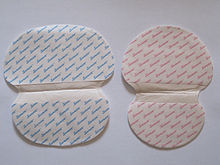- Underarm liners
-
Underarm liners, the main alternative to antiperspirants, absorb underarm sweat before the sweat reaches clothing. No artificial chemicals are used. The liners are applied directly to clothing. Underarm liners can eliminate armpit stains sometimes caused by chemicals in antiperspirants. Underarm liners are also known as underarm shields, underarm pads, sweat guards, and dress shields.[1]
Contents
History
For centuries, bathing was far from common in many parts of the world. Heavy colognes were used to mask body odour. Not until the late nineteenth century did chemists develop products that prevented the formation of body odours. Early antiperspirants included creams, solids, pads, dabbers, roll-ons, and powders. Today, anti-perspirant sticks are most common. But an older form of sweat protection, underarm liners, never went away.[2][3]
Reusable underarm liners
Today's underarm liners include the traditional reusuable (or washable) products. But they also include newer, disposable products. Reusable liners are used by women only since the liner secures to the underarm area of the garment via an adjustable strap on a bra. Reusuable liners consist of double ply cotton on one side and either a nylon or vinyl barrier on the other side. The cotton side rests on the actual skin of the armpit while the vinyl or nylon rests on the clothing as the final barrier, preventing any sweat from reaching the woman's garments.
Disposable underarm liners
Disposable liners are offered to both men and women. The thin liner is a "peel and stick" product the user places directly onto the inside of the garment. One side of the liner consists of a plastic barrier with a layer of purposely formulated glue. The other side of the liner is the absorbent side. Constructed with air-laid paper, it rests against the skin of the armpit and absorbs the moisture.
See also
Medical Condition of Excessive Sweating: hyperhidrosis
References
- ^ Cobb, Linda (2002). How the Queen Cleans Everything. SImon and Schuster. p. 289. ISBN 978-0743451451.
- ^ Laden, Karl (1999). Anti-Perspirants and Deodorants, Second Edition. CRC Press. ISBN 978-0824717469.
- ^ "Antiperspirant/Deodorant Stick". How Things Are Made. http://www.madehow.com/Volume-5/Antiperspirant-Deodorant-Stick.html.
Categories:- Personal hygiene products
Wikimedia Foundation. 2010.

